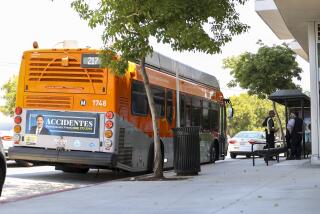Biden in Africa pledges millions for a rail project the U.S. hopes will boost its influence there

- Share via
LUANDA, Angola — President Biden on his visit to sub-Saharan Africa pledged another $600 million for a cross-continent rail corridor project Wednesday, telling regional leaders that “Africa has been left behind for much too long. But not anymore. Africa is the future.”
Biden used the third and final day of his visit to Angola to showcase the Lobito Corridor railway, where the U.S. and allies are investing heavily to refurbish 800 miles of train lines in Zambia, Congo and Angola.
The project aims to advance the U.S. presence in a region rich in cobalt, copper and other critical minerals used in batteries for electric vehicles, electronic devices and clean energy technologies. By the end of the decade, the rail line could even go a long way toward linking southern Africa’s west and east coasts.
“It’s a game changer,” Biden said, and cited the transformational effect of building the transcontinental railroad in the United States. Cargo that once took 45 days to get to the United States — usually involving trucks to South Africa — will now take less than 45 hours, he said. He also predicted the project could transform the region from a food importer to exporter.
Altogether, Biden said the U.S. has invested $4 billion along the Lobito Corridor.
He was joined by the presidents of Angola, Congo and Zambia. Congo’s President Felix Tshisekedi said the project could create tens of millions of jobs in his country, saying it will “change the trajectory of our region for good.” Zambia’s President Hakainde Hichilema called the project “a huge, huge, huge opportunity.”
President Biden is using the first visit to Angola by a U.S. president to promote billions of dollars of commitments to the sub-Saharan African nation.
Biden said the Lobito Corridor constituted the largest U.S. investment in a train project outside the country.
On Wednesday, he flew from the Angolan capital of Luanda to Lobito on Africa’s western coast to tour port facilities linked to the corridor and meet with representatives from companies that stand to benefit from the project.
The U.S. is promoting the Lobito Atlantic Railway upgrade as a catalyst that it hopes will spark a new era of Western private sector investment in this part of Africa. The corridor has also drawn financing from the European Union, the Group of 7 leading industrialized nations, a Western-led private consortium and African banks.
Biden announced that Congo had also committed a new $553-million direct loan to the railway to upgrade and operate more than 621 miles of line from Lobito to the Congo border.
The Biden administration also hopes to counter China’s growing influence in Africa. His long-awaited first trip to sub-Saharan Africa as president came in a week when trade tensions between the U.S. and China over rare minerals needed in new technologies went up a notch.
China already has heavy investments in mining and processing African minerals and has used its Belt and Road Initiative infrastructure strategy to promote its economic and political influence.
President Biden is making his long-awaited visit to sub-Saharan Africa to showcase a U.S.-backed railway project across three countries.
In September, China said it had signed a deal with Tanzania and Zambia to revamp a separate railway line going east from Zambia to Tanzania’s commercial hub of Dar es Salaam on Africa’s east coast.
The countries had previously worked together to build the railway line in the 1970s, but it fell into disrepair. China’s move to renovate it — announced on the sidelines of this year’s China-Africa forum — is seen by some analysts as the Chinese response to the Lobito Corridor upgrade.
A senior U.S. administration official called the Lobito Corridor the heart of competing with China, not as a political adversary but from a business standpoint.
The idea is, rather than just pump in aid, Washington will attempt to grow U.S. influence by promoting projects that can spark investment and help countries over the long haul. The U.S. is looking to replicate the Lobito Corridor project in other parts of the world, said the official, who briefed reporters on condition of anonymity to offer details that hadn’t yet been made public.
The corridor won’t be completed for years, meaning much of the work would come during the administration of Donald Trump, who takes office Jan. 20. The Biden White House says Republicans in Congress have supported past efforts to promote African business interests through targeted investments and that such initiatives have appealed to Trump and his key advisors in the past.
“I want to come back and ride the whole thing,” Biden told the African leaders, before leaving the continent.
Weissert writes for the Associated Press. AP writer Gerald Imray in Cape Town, South Africa, contributed to this report.
More to Read
Sign up for Essential California
The most important California stories and recommendations in your inbox every morning.
You may occasionally receive promotional content from the Los Angeles Times.












